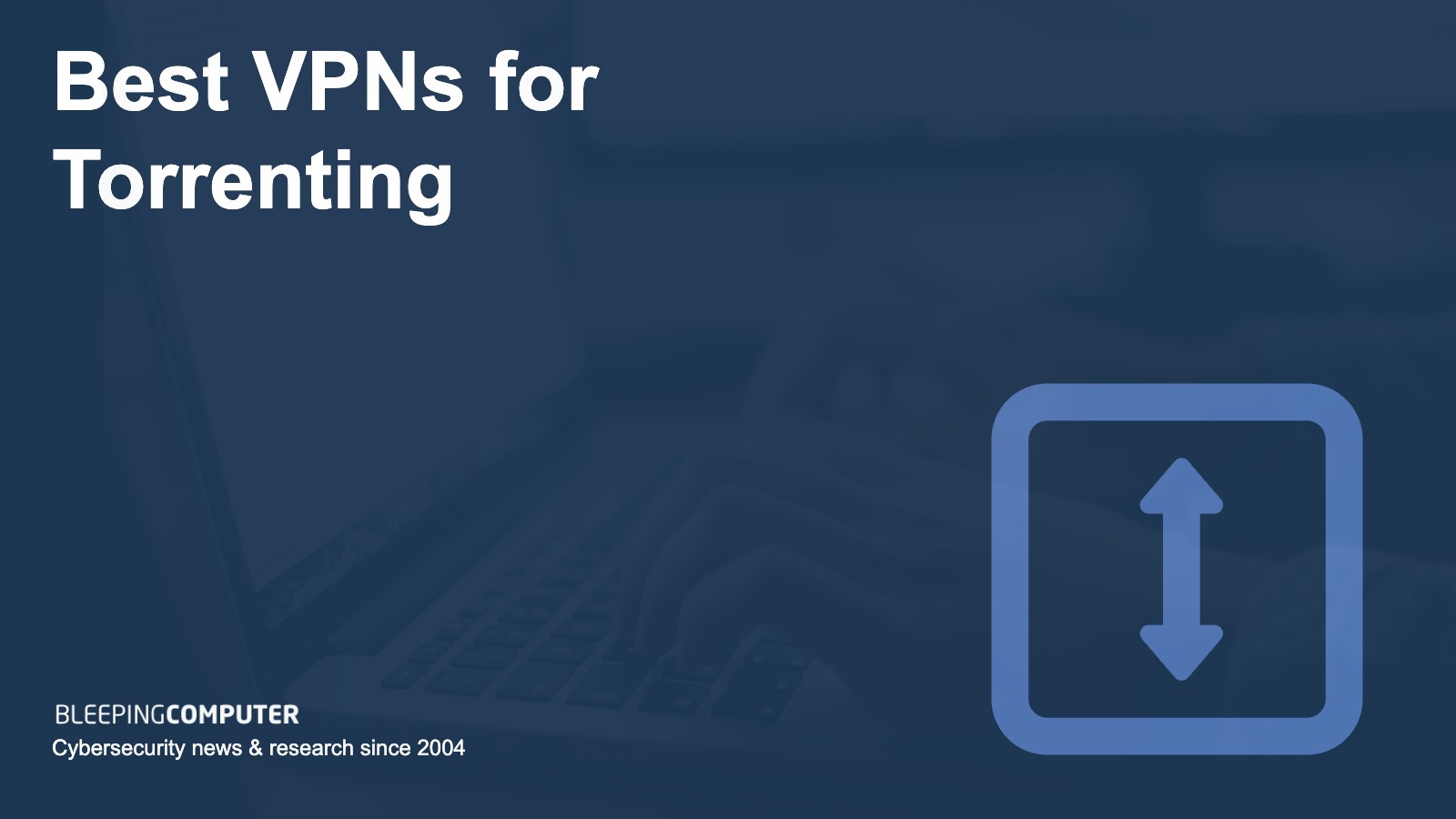A VPN is a smart way to torrent safely and privately from any location. Here’s everything you need to know about the best VPNs for torrenting securely. 
Torrenting is a popular way to share large files quickly and easily, but it’s not a good idea to do so without a Virtual Private Network. Because you’ll likely be downloading files from anonymous sources, we’d strongly recommend a VPN for an additional layer of security.
Not all providers are up to the task. For instance, some torrenting VPNs have been known to leak user data, or are too slow for downloading files in the first place.
Other providers don’t allow for peer-to-peer (P2P) activities, or might not be suitable for torrenting apps. Lastly, some VPNs keep logs of user activity, making it easier to trace any individuals using the service, whether it’s for torrenting or anything else.
We’ve identified eight of the best VPNs for P2P file-sharing. We’ll discuss each provider in detail below, but here’s a quick summary with our top picks for torrenting.
The best VPNs for torrenting:
- NordVPN: Our top recommendation for torrenting. Fast speeds, strict no-logs policy, P2P-optimized servers, advanced security features, streaming support, and comes with a risk-free 30-day money-back guarantee.
- Surfshark: Low-cost provider with servers in 100+ countries, unlimited device connections, ad blocking and malware filtering, support for P2P, and a zero-logs policy.
- ExpressVPN: High-end service with beginner-friendly apps and support for torrenting. Fast speeds, reliable connections, kill switch, and custom protocol.
- Mullvad: Specialist service with some of the fastest download speeds you’ll find. Advanced features and supports port forwarding and split tunneling.
- Proton VPN: Secure servers and fast speeds, streaming support as well as P2P, decent free tier, and lots of privacy features.
- CyberGhost VPN: User-friendly provider with optimized servers, capable connection speeds, and an extended 45-day money-back guarantee.
- IPVanish: Supports P2P, is quick enough for fast downloads, and has lots of servers specifically designed for torrenting.
- Atlas VPN: P2P-friendly, fast speeds, and no connection limits. Capable of accessing various popular streaming platforms.
Summary Table
| No value | TEST WINNER | No value | No value | No value | No value | No value | No value | No value |
| No value |
NordVPN
 www.nordvpn.com www.nordvpn.com
|
Surfshark
 www.surfshark.com www.surfshark.com
|
ExpressVPN
 www.expressvpn.com www.expressvpn.com
|
Mullvad
 https://mullvad.net https://mullvad.net
|
Proton VPN
 www.protonvpn.com www.protonvpn.com
|
CyberGhost
 www.cyberghost.com www.cyberghost.com
|
IPVanish
 www.ipvanish.com www.ipvanish.com
|
Atlas VPN
 www.atlasvpn.com www.atlasvpn.com
|
| Ranking | 1 | 2 | 3 | 4 | 5 | 6 | 7 | 8 |
| Logging Policy | No identifying data | No logs stored | No identifying data | No logs stored | No logs stored | No identifying data | No logs stored | No logs stored |
| Devices Supported | Windows, MacOS, iOS, Android, Linux, Smart TVs, Routers | Windows, MacOS, iOS, Android, Linux, Smart TVs, Routers | Windows, MacOS, iOS, Android, Linux, Smart TVs, Routers | Windows, MacOS, iOS, Android, Linux, Routers | Windows, MacOS, iOS, Android, Linux Android TV | Windows, MacOS, Linux (command line), iOS, Android, Amazon Fire TV | Windows, MacOS, iOS, Android Amazon Fire TV | Windows, MacOS, iOS, Android, Linux Android TV, Amazon Fire TV |
| Avg Speed (Mbps) | 100+ Mbps | 100+ Mbps | 100+ Mbps | 100+ Mbps | 100+ Mbps | 100+ Mbps | 100+ Mbps | 100+ Mbps |
| Simultaneous Connections | 6 | Unlimited | 5 | 5 | 10 | 7 | Unlimited | Unlimited |
| Best deal (per month) | $3.39 Up to 72% OFF + gift |
$2.19 86% off 2yr starter plan |
$6.67 Save 49% |
$5.50 $5.50/mo |
$4.99 SAVE 50% |
$2.03 SAVE 84% |
$2.50 SAVE 77% |
$1.83 SAVE 83% |
A lot of VPNs allow the user to torrent while connected to their servers. However, performance will vary depending on your chosen provider, and it can be tough to figure out which is best for the job.
We narrowed the field with our inclusion criteria. Here are some of the non-negotiable characteristics we looked for when picking out the best providers for torrenting safely:
- Servers in multiple locations that allow the user to torrent safely
- Torrent-friendly features like a kill switch and split tunneling
- Connection speeds will dictate how well the user is able to perform any online task, and are especially important for P2P file sharing. No bandwidth caps.
- Privacy and security, including everything from leak tests to available protocols
- In order to qualify for one of the top three positions, the VPN must operate a 100% diskless server network and have had its infrastructure audited by a reputable third party
For more information about the specific criteria we used for picking the best VPNs for torrenting, check out the testing methodology section found later in this article.
WANT TO TRY THE TOP VPN RISK FREE?
NordVPN is offering a fully-featured risk-free 30-day trial if you sign up at this page . You can use the VPN rated #1 with no restrictions for a month - great if you want to binge your favorite show or are going on a short trip.
There are no hidden terms - just contact support within 30 days if you decide NordVPN isn't right for you and you'll get a full refund. Start your NordVPN trial here .
Best VPNs for torrenting
Here’s a roundup with detailed information about each of the VPNs that have made it onto this list.
1. NordVPN

NordVPN is our top pick for torrenting, offering a collection of specialty servers dedicated to the task. These will provide the fastest speeds from a variety of different locations, and it has a network of shared IPs in 60 countries. A shared IP ensures that your traffic is mixed with other users, making it harder to trace an individual connected to a server.
As well as a kill switch, the service openly supports P2P file-sharing, offering strong DNS leak protection, and a proven no-logs policy. Apps and infrastructure have been audited independently, and it uses RAM-only servers. Nord includes AES-256 encryption, and it also comes with split tunneling.
Advanced features include its custom NordLynx protocol, as well as Meshnet. The latter is available free of charge without a subscription, allowing users to create private, encrypted tunnels between devices. You’ll be able to choose whether the kill switch works with all data, or you can configure it to cut the connection if something goes wrong with the torrent client.
Being based in Panama is another positive. Nord can access streaming services like Netflix US, Hulu, BBC iPlayer, and Amazon Prime Video from abroad. There are apps for Windows, macOS, iOS, Linux, and Android. Average download speeds come in at just under 200 Mbps.
You’ll have to look elsewhere for port forwarding.
Pros:
- P2P-optimized servers
- Strong DNS leak protection
- Diskless infrastructure
- Speedy connections
- Keeps no user logs
Cons:
- Lacks port forwarding
- Some servers can’t be used for torrenting, although there are optimized alternatives
BEST VPN FOR TORRENTING: NordVPN is our top pick for torrenting, with high-speed servers and a wide selection of features to improve online security. Streaming support, NordLynx protocol, Meshnet, and audited apps and infrastructure. Risk-free 30-day money-back guarantee.
Read our full review of NordVPN.
2. Surfshark

Surfshark is another solid option that supports P2P, and has a wide collection of servers in 100+ countries. Average speeds work out to 188 Mbps, which is a good result considering it’s one of the more affordable VPNs on the market.
The provider offers everything you need for downloading torrents, including 256-bit AES encryption, a kill switch, and leak protection. P2P is permitted with all servers. It allows the user to connect unlimited devices, so you’ll never be capped while the VPN is in use. You’ll find apps for Linux, iOS, Android, Windows, and macOS, as well as support for routers.
Previously based in the BVI, Surfshark is now headquartered in the Netherlands (Nine Eyes). As such, it’s vital that the VPN doesn’t log any personally identifiable information. It comes with a strict no-logs policy, and applications have been independently audited for peace of mind.
Surfshark is also a good choice for streaming, accessing 21 Netflix catalogs, and various other geo-blocked sites and services.
Pros:
- Diskless infrastructure
- Unlimited device connections with a single Surfshark account
- Great for downloading torrents
- Works with streaming services including Netflix, iPlayer, and Hulu
- Audited zero logs policy
Cons:
- Some servers are a lot slower than others
- Lacks port forwarding
GREAT BUDGET P2P VPN: Surfshark handles downloading torrents with ease. Affordable subscriptions, servers in 100+ countries, decent speeds, streaming support, kill switch, and apps for all devices. 30-day money-back guarantee.
Read our full review of Surfshark.
3. ExpressVPN

ExpressVPN is a reliable provider, benefiting from a large network containing thousands of servers in 160+ cities and 105+ countries. It’s definitely up to the task as P2P file sharing is supported from all locations.
It comes with useful features like split tunneling. Its proprietary Lightway protocol boosts average download speeds to 176 Mbps. As well as torrenting, ExpressVPN is capable of accessing lots of streaming services from countries like the United States and the UK. In fact, it’s arguably second to none when it comes to accessing obscure websites and services from abroad.
You’ll find solid encryption, along with beginner-friendly apps for Windows, macOS, Android, iOS, and Linux. ExpressVPN has the best router support on the market, with custom firmware that includes a built-in kill switch.
The provider is headquartered in the British Virgin Islands, which is ideal as the region has no data retention laws. In any case, Express comes with a no-logs policy, and the service has been independently audited.
It would be higher on the list, if not for the fact that it’s slightly more expensive than the norm, and only allows for eight simultaneous connections. The service also lacks port forwarding, which could be a deal-breaker for some users.
Pros:
- Custom Lightway protocol
- Fully audited no logs policy
- Decent speeds
- Supports torrenting
- Diskless infrastructure
Cons:
- No port forwarding
- Slightly more expensive than the norm
RELIABLE TORRENTING: ExpressVPN is a beginner-friendly service that is a reliable option for users who want to stream or download torrents. Split tunneling, Lightway, and audited infrastructure and apps. 30-day money-back guarantee.
Read our full review of ExpressVPN.
4. Mullvad

Mullvad recorded the fastest speeds of all of the providers we’ve tested (660 Mbps), and it allows for torrenting on every server. With roughly 700 in total, it’s not the largest network by any means, but you’ll definitely be able to download files quickly.
It comes with DNS leak protection, toggleable obfuscation, and an always-on kill switch. Mullvad allows port forwarding, so it’s perfect for faster download speeds from more seeders. Other users will be able to connect to your BitTorrent client and leech files.
The provider is based in Sweden, and doesn't log any activity or connection data. The service is audited regularly and has apps for Windows, macOS, iOS, and Android. It also offers a browser in collaboration with the Tor Project, which is free for anyone to use.
It’s not the best option if you’re interested in accessing geo-restricted streaming services like Netflix. It’s fair enough, as the VPN primarily focuses on privacy. Mullvad doesn’t have live chat support, so it might not be the best option for new users.
Pros:
- Highly impressive connection speeds
- Supports P2P on any server
- Allows for port forwarding
- Logs no user data
Cons:
- Doesn’t work with many streaming services
- Lacks live chat support
ULTRA-FAST SERVERS: Mullvad is a specialist service with incredibly fast speeds. Port forwarding, advanced privacy features, apps for all major platforms, IPv6 support, and a 30-day money-back guarantee.
Read our full review of Mullvad.
5. Proton VPN

Proton VPN is a Swiss-based provider that offers a range of advanced privacy features. It has over 3,000 servers in 71+ countries, and average speeds work out to 320 Mbps. Designed by the team behind ProtonMail, it comes with a decent free tier, although there are some limitations to consider.
For example, torrenting isn’t permitted with the free servers, so you’ll need to get a Plus subscription to share files. This gives access to P2P servers, which are optimized for BitTorrent network traffic.
Plus, users also get access to streaming services, as well as features like split tunneling, and port forwarding. Once again, this is useful if you want to seed torrents, as it enables other users to reach your torrent client via the internet. You’ll also find helpful online guides for setting up port forwarding on various popular clients like qBittorrent, Vuze, and uTorrent via Proton’s website.
A lack of live chat is disappointing, even if there’s lots of information available on the Proton VPN website. It’s also one of the more expensive options, but it’s arguably worth it when factoring in the various features on offer.
Pros:
- Offers both split tunneling and port forwarding
- Watertight no-logs policy
- Capable free tier
- Fast connection speeds
Cons:
- Lacks live chat support
- Port forwarding only available on Windows
SPEEDY AND SECURE TORRENTS: Proton VPN is a premium service that offers split tunneling and port forwarding, along with fast download speeds, and P2P support. 30-day money-back guarantee.
Read our full review of Proton VPN.
6. CyberGhost

CyberGhost VPN is especially user-friendly, with servers clearly labeled for tasks like streaming and torrenting. It has over 10,000 high-speed (296 Mbps) servers worldwide, in a network which is larger than any of the other VPNs on this list. You’ll find servers in 116+ locations across 100+ countries.
It’s ideal for torrenting, due to features like a sturdy kill switch, and 256-bit AES encryption with perfect forward secrecy. An auto-connect feature is built into the kill switch, so you’ll be able to leave your client to resume downloading with no input.
Extras include ad blocking and malware filtering, as well as split tunneling. However, it lacks some advanced features like port forwarding and MultiHop support.
CyberGhost VPN is headquartered in Romania. This is great in terms of jurisdiction, and the VPN maintains a solid no-logging policy. Having been independently verified by auditing company Deloitte, it’s perfect for improving online privacy.
A collection of user-friendly apps for Windows, iOS, Android, macOS, and Linux ensure that you’ll be able to stream or torrent from a range of locations with no hassle.
Pros:
- Beginner-friendly apps for all major platforms
- Zero logs
- Great speeds in our tests
- Labeled P2P-optimized servers, vast network
Cons:
- Fewer advanced features than some of the competition
- The kill switch cannot be disabled on macOS, Android, or iOS
BEGINNER-FRIENDLY APPS: CyberGhost VPN is a viable choice for torrenting. Easy to set up and use, kill switch, top connection speeds, thousands of servers, zero logs, and an extended 45-day money-back guarantee.
Read our full review of CyberGhost VPN.
7. IPVanish

IPVanish ticks many of the boxes if you need a secure VPN for torrenting. Speeds that can reach 250+ Mbps are going to be quick enough for most users, and it allows for unlimited simultaneous device connections. It has a network of 2,200+ servers that are owned and operated by the provider rather than being rented.
It comes with a SOCKS5 proxy, which is ideal for preventing the user from exposing their home IP address to other peers. You’ll find guides for setting up popular clients like uTorrent, Vuze, and Deluge with its proxy online. IPVanish keeps no user logs, and it allows for split tunneling.
The provider aced our leak tests, and its logging policy has been audited by Leviathan Security Group. This is a good thing, as IPVanish is based in the US. As you may have guessed, the country isn’t ideal in terms of jurisdiction. However, this does make the VPN adept at accessing streaming platforms from the USA.
Pros:
- Speedy server connections
- Strong security features and apps for all popular devices
- Unlimited device connections
- SOCKS5 proxy
Cons:
- Based in the United States
- Lacks port forwarding
FAST AND AFFORDABLE PROVIDER: IPVanish is fast and affordable, with unlimited devices and a SOCKS5 proxy. WireGuard, US streaming support, and a simple 30-day money-back guarantee.
Read our full review of IPVanish.
8. Atlas VPN

Atlas VPN recorded average speeds of 258 Mbps, and is ideal for P2P file sharing. A selection of 1,000+ VPN server locations in 42+ countries isn’t the largest, but it gets the job done effectively. It’s also a great pick for streaming content while abroad.
The USA HQ places it within the jurisdiction of a key Five Eyes member. On the other hand, it does come with a watertight no-logging policy to hide your online activity. Premium plans come with unlimited bandwidth, as well as robust sercurity features including SafeSwap and MultiHop+ servers.
There are no dedicated P2P servers to pick from, but it has a speedy network of servers in various locations that are an excellent choice for torrenting. This should help to ensure quick downloads, and it keeps no connection logs.
Atlas has apps for Windows, macOS, iOS, Android, and Firestick. The kill switch was a little temperamental on desktop during testing, but it’s still a great VPN for Android users as the OS has a native alternative.
Pros:
- Fast speeds for torrenting
- Unlimited connections, apps for all major operating systems
- Robust security features including a kill switch, MultiHop, and solid encryption
- No-logs VPN
Cons:
- Based in the United States
- Lacks port forwarding
FAST WIREGUARD CONNECTIONS: Atlas VPN implements WireGuard to provide fast speeds for torrenting. Affordable subscriptions, MultiHop, streaming support, split tunneling, and a 30-day money-back guarantee.
Read our full Atlas VPN review.
Methodology: How we chose the best VPNs for torrenting
Rather than picking out providers at random, we’ve compiled a comprehensive VPN testing methodology. Our strict criteria ensure only providers dedicated to digital privacy, with excellent usability and optimal performance, can make it onto our list.
- P2P support and servers: Some VPNs don’t allow the user to torrent. It’s always helpful if the provider comes with extra features like split tunneling and port forwarding. Ideally, the VPN will have servers optimized for torrenting, and will be able to access streaming sites.
- Speeds and performance: Connection speeds will dictate how quickly your files will be downloaded. Faster speeds are obviously preferable.
- Privacy and security: How does the VPN perform in terms of security and privacy? We look at features, their implementation, and everything from leak protection to encryption and protocols. Every VPN we recommend adheres to a no-logs policy, so they don’t store any identifiable data about connected users. The VPN should have strong encryption if you plan to access torrenting sites.
- Third-party audits: Trust is the foundation of the value that VPNs provide. You are essentially placing more faith in your VPN provider than you are in your ISP. Almost every provider says they are a ‘no logs' VPN. The only ways to test this claim are either through the courts or through audits. We will only consider providers for our top three positions if they have undergone infrastructure audits from a reputable third party. While this isn't foolproof, it's the closest the industry has to a verification process for logging policies.
- Diskless infrastructure: Again, this is a prerequisite to be considered for one of the top three positions on BleepingComputer. While the data stored on a VPN server should be minimal, it could, theoretically, be accessed if the servers were seized or hacked. Moving processes to RAM means that no information can be physically taken from servers and it is wiped on shutdown. It can also easily be wiped as a part of regular security procedures.
How to torrent safely with a VPN
It should only take a few minutes to begin torrenting safely with a VPN. If you’re not sure what to do, we’ve put together a quick step-by-step guide to help get you started:
- Sign up with a provider that allows the user to torrent from a nearby server. We highly reccommend NordVPN.
- Download the relevant VPN app/s to your device.
- Open the app, and sign in with your login details.
- Ensure that the kill switch is activated.
- Select a nearby server that allows for torrenting. Some VPNs have servers that are optimized for P2P activities.
- You’ll now be able to torrent safely.
Depending on your VPN and torrenting app, you might be able to bind your torrenting app to the VPN, ensuring that you only download files through the VPN. Check your VPN and torrent app settings.
Are free VPNs good for torrenting?
Free VPNs tend to struggle when it comes to torrenting. Speeds are often far slower with freemium servers, while many providers won’t allow the user to share P2P files in the first place. Bandwidth may also be capped, which will cause your download to stop midway if you reach the data limit.
The majority of free VPN services lock important features behind a paywall, and might be missing out on a kill switch, which is important for torrenting securely.
A number of free providers have been caught selling user data, or were found to contain malware. Others lack basic encryption, so you’ll be leaking data while the VPN is in use.
Do VPNs protect your privacy when torrenting?
Yes, a VPN is ideal for improving online privacy when torrenting.
Your ISP will be unable to see that you are torrenting, as any files that you download or upload are encrypted. The same goes for all data sent to and from your device while the VPN is active.
You’ll also be able to stop other people from seeing your IP address, which can be used to identify your approximate location and your ISP. Since it’s a peer-to-peer protocol, everyone who uses the same torrent file is connected via a ‘swarm’. Every device in the swarm can see all of the other IP addresses that are connected.
Your IP address can be used against you by copyright trolls, who infamously send threatening settlement letters to torrent users. A VPN will mask your IP address, assigning the user with a new IP that matches the server location you’ve selected.
VPNs tend to use shared IP addresses, meaning there are potentially hundreds of users that are assigned with the same VPN IP address at any given time. This makes it extremely difficult to trace P2P activities back to a single user. In any case, a no-logs VPN should have no information to hand over.
If you mask your IP address, you’ll also be better protected from hackers, or anyone who is aiming to find out more personal information about you.
Why hide your IP address when torrenting?
There are numerous reasons why it’s a good idea to hide your IP address while torrenting. With your IP address, anyone will be able to see your approximate location, and it could also open up the user to DDoS attacks. A VPN will allow you to hide your IP address, as well as your current location, and the name of your ISP.
We strongly recommend avoiding illegal torrents. Copyright trolls scour the web and monitor popular torrents hoping to find the unique IP addresses of devices that are connected to the swarm. These IP addresses are then matched with an internet service provider, which is typically how users end up with threatening settlement letters arriving by mail.
As such, it makes sense to hide your IP address while using a client like BitTorrent. Many VPNs aren’t up to the task, especially when it comes to data leaks. Typically, leaks are as follows:
- DNS leaks
- IPv6 leaks
- WebRTC leaks
The VPNs listed above all offer leak protection, as well as a kill switch just in case the connection drops off unexpectedly. You’ll need to opt for a no-logs provider, ensuring the service has no record of your IP address.
Avoid hackers when torrenting
When you engage in torrenting, you connect directly with other users worldwide using a peer-to-peer (P2P) network. This creates a direct link between your computer and fellow users in the torrent swarm. The advantage is that you can download various pieces of the torrent from multiple users at the same time. However, the downside is that you have no way of identifying these other users, and some could be potential threats.
If you unknowingly connect to a malicious user via P2P, they could exploit your IP address to scan your network for open ports and vulnerabilities. This opens the door for cybercriminals to infiltrate your network, take control of devices, install malware, add your devices to a botnet, and steal sensitive data for purposes like phishing, fraud, or identity theft.
This underlying risk makes torrenting a potentially hazardous activity because you can't predict when you might encounter a malicious actor who probes your network for vulnerabilities. This is where a VPN comes to your rescue.
When you employ a VPN, only the VPN's IP address is visible to your peers, ensuring the safety of your network. This allows you to torrent with peace of mind because it is impossible for other users to track your IP address. The only consideration is that many VPNs suffer from leaks, so you must stick to a recommended provider that is completely safe for torrenting.
Prevent prospective invoicing
When downloading torrents, there's a risk of being targeted and receiving legal notices from attorneys representing copyright holders. We strongly advise against infringing copyright laws and emphasize the importance of always complying with your country's regulations.
However, it's also wise to use a VPN to prevent your Internet Service Provider (ISP) from detecting your downloads. This ensures your online privacy and keeps your activities concealed. By doing so, you can avoid attorneys tracking you down to send you prospecting invoicing letters simply for visiting a torrent site.
Torrenting VPN: FAQs
Should I use port forwarding to download torrents?
The majority of commercial VPNs don’t support port forwarding, as we’ve noted above. In theory, the feature should be able to improve download speeds by allowing the torrent client to connect to more peers.
However, port forwarding can degrade user privacy. Users who share the same VPN IP address will be limited to the same ports, aside from the user who ports forward. This could make it easier to trace P2P activities back to an individual user.
Avoiding malware in torrents
Be wary of malware found in torrents and torrent websites. It's an easy way to get users to inadvertently infect their own devices. Torrents are often uploaded anonymously and may contain viruses and malware. It’s a good idea to scan torrents with antivirus software. We’d also recommend checking out any comments before downloading a file.
Is torrenting illegal?
Torrenting isn’t illegal, as it’s just a method which allows users to share and download large files quickly and easily. Copyrighted content is the main issue with torrenting, as sharing files like movies, music, software, or games without permission is where it begins to enter illegal territory. Sharing copyrighted files is illegal in most countries.
Downloading copyrighted files is a violation of copyright law, and can potentially lead to fines, legal action, or even criminal charges. Your ISP may also take a dim view of torrenting. Your ISP can throttle internet speeds, or potentially terminate your service entirely. We’d advise you to avoid downloading copyrighted material to avoid any issues.
Why do some VPNs block torrents?
Some VPNs have been forced to block torrents, while others prefer to avoid the hassle of dealing with companies issuing copyright complaints. In 2022, TorGuard promised to "use commercially reasonable efforts to block BitTorrent traffic on its servers in the United States using firewall technology," after being sued by over two dozen film studios.
What is the best server location for torrenting?
The ‘best’ server for torrenting is relative, and will likely depend on where you’re currently located. Generally, you’ll see an improved performance if the server is nearby. In terms of privacy, it doesn’t really matter as long as the VPN doesn’t keep any logs.
Which devices can I use to torrent?
You can use various mobile and desktop devices to torrent files. This includes Android and iOS devices, as well as Windows and macOS. Some providers also offer support for Linux. Once you’ve installed the torrent client and the VPN you’ll be ready to get started safely.
Why is it important to use a kill switch?
A kill switch should be seen as the last line of defense, just in case something goes wrong with your VPN connection. It works to stop your real IP address and torrent traffic from leaking, which could expose your activities to your ISP, copyright trolls, or anyone else. We’d strongly recommend using a kill switch at all times if you plan to torrent.
Each of the providers listed above comes with a kill switch. Some aren’t enabled by default, so make sure to check through the settings. Desktop apps are more likely to have a kill switch than mobile versions.
Can using a VPN increase your torrenting speed?
Not unless your connection is being throttled by your ISP. If so, your ISP will be unable to see that you’re connected to a torrenting client, so it won’t slow your speeds.
Can my ISP see the torrents I am downloading?
Yes, when you download torrents your ISP can see what you’re up to because it is in the middle of you and the peers you connect to and can see the data that is passing from the machine to yours and vice versa. In addition, ISPs can see that you are visiting torrent websites, even if they are protected by HTTPS (although they won't be able to see the individual pages you visit on the website as long as it has HTTPS).
Unfortunately, if you don't use a VPN, your connection to other peers will not be encrypted, meaning that your ISP may track which peers you connect to and monitor your downloads.
The important thing to remember is that it is possible for ISPs to track user activity, and some may even suspend your internet service if they suspect you’re downloading files illegally.
ISPs are able to track a lot of user activity, including any websites you navigate to when surfing the web. A VPN encrypts all data, preventing your ISP from keeping tabs on what you download. However, it’s still illegal to download copyrighted material, even if you have a VPN active. Make sure to stick with files that are legal and ethical.
Do ISPs work with prosecutors and copyright holders to catch pirates?
Unfortunately, the answer to this question is yes. ISPs have been known to cooperate with lawsuits and investigations related to copyright infringement. In some cases, ISPs in various countries have assisted copyright holders and legal teams in identifying internet users suspected of downloading copyrighted content through torrenting.
For example, the case of Dallas Buyers Club in 2015 involved ISPs working with Voltage Pictures to track down individuals who had torrented the movie. The film studio attempted to extract large sums of money from users in various countries, including Canada, the Netherlands, and Australia.
In Australia, the Federal court ruled that the film company could only seek damages equal to the rental of the movie. However, Australian ISPs could still legally be compelled to release the contact details of users suspected of downloading the movie for free.
Speculative invoicing letters were sent to users in various countries after their contact details were gained from ISPs. These letters demanded a settlement to avoid potential legal action. This practice has been criticized for its perceived extortion-like nature, as the demanded amounts often exceed the cost of renting or purchasing the content.
Using a VPN can help protect against such tracking and potential legal consequences. By encrypting your internet traffic and masking your IP address, a VPN prevents ISPs from monitoring your peer connections and downloads. This safeguards your privacy and makes it more difficult for copyright holders to obtain your contact details at a later date.
However, it's important to note that not all VPNs allow or support torrenting. Some VPN providers have faced legal action for allegedly facilitating or encouraging copyright infringement. As a result, certain VPNs have discontinued support for P2P connections and may even block access to popular torrent sites through their servers.


Post a Comment Community Rules
You need to login in order to post a comment
Not a member yet? Register Now